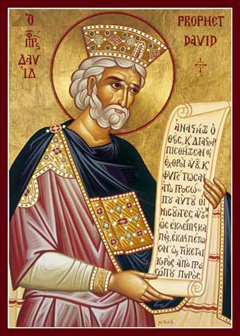by Fr. Patrick Henry Reardon
 When—apparently in the third century before Christ—the Sefer Shemuel was divided into 1st and 2nd Samuel, its editors found a more-than-satisfactory division point at the death of Saul.
When—apparently in the third century before Christ—the Sefer Shemuel was divided into 1st and 2nd Samuel, its editors found a more-than-satisfactory division point at the death of Saul.
Thus, the first book ends with the Battle of Mount Gilboah, and the second begins with David who, learning of that battle, realized that he, not Saul, was now the King of Israel. The messenger bearing this news was an improbable Amalekite straggler, who presents David Saul’s crown and arm-band, boasting the he had given the dying Saul the coup de grace on Mount Gilboah. The messenger evidently expected David to welcome the news and receive him with gratitude.
The reader at this point, already familiar with the circumstances of Saul’s death, knows the Amalekite is lying. David, too, has his suspicions; if this Amalekite had time and opportunity to abscond with Saul’s crown and bracelet, why did he not remove the king’s body from the battlefield and save it from desecration?
Instead, according to the man’s own account, he presumed to lay a violent hand on the Lord’s anointed, a thing-the reader knows (1 Samuel 24:1-7; 26:4-11)-David has twice refrained from doing. Indeed, a man who would murder Saul would likely feel free to kill any king, including David himself. As far as David is concerned, then, such a one has forfeited his own life.
The reader should appreciate the deeper significance of this scene, which represents the first trial of Israel’s new king.
This story continues, in fact, a sustained thematic contrast between David and Saul, inasmuch as it stands in opposition to a parallel story in 1 Samuel 16. In that earlier account Saul was commanded to slay the Amalekites, specifically their king, Agag. It was partly for his failure to obey that order that the Lord rejected Saul and sought out a new king for His People. Now this new king is subjected to a similar trial, also involving an Amalekite.
The problem with this Amalekite is his serious misunderstanding of David. Expecting the new king’s response to be positive—even enthusiastic—he lies through his teeth, in graphic detail, to brag how he put the tragic Saul to death. In this respect the reader recognizes a further contrast, this time between David and the Amalekite himself. The latter’s is a darkened mind. He is the carnal man, the self-serving moral imbecile, who unwittingly involves himself in matters beyond his grasp.
David has met this kind of individual before. Perhaps he was reminded of Doeg the Edomite, the treacherous friend of Saul; the scoundrel who slew the priests of Nob.
This Amalekite, comprehending nothing of David or David’s God, fancies that all men are guided by the same mendacity and self-service that govern his own life. Hence, he expects David to jump at the chance to exploit the death of Saul, just as he exploited the death of Saul.
He represents, therefore, the proverbial “fool,” chronically unable to comprehend the path of righteousness and wisdom. He and David live in very different moral worlds. In laying a violent hand on Saul, this Amalekite committed the very offense David found morally repugnant.
In the eyes of the biblical author, therefore, the new king does the world a favor; he rises to the moral challenge of removing this man’s shadow from the face of the earth-redeeming, thereby, Saul’s earlier failure to punish the fool.
The contrast of David and the Amalekite can be read—following the Wisdom tradition—to form an illustration of Psalm 1. In this account, accordingly, David is the blessed man who strays not in the counsel of the ungodly nor sits in the seat of the scornful.
The Amalekite, in contrast, is not so. No, he is, most emphatically, not so. He is as the chaff dispersed by the wind, and, at the end of this story, the way of the ungodly will perish.
David, refusing to advance his own ambition by killing Saul, patiently waits for the Lord to give him the kingdom He had promised. Convinced that
“the Lord knows the way of the righteous,”
he believes, with the Psalmist, that the tree planted by the living water
“will bring forth its fruit in due season.”
David does nothing to hasten the hour. His leaf, then, does not wither, and he prospers in whatever he does. His delight, day and night, is the Law of the Lord.
